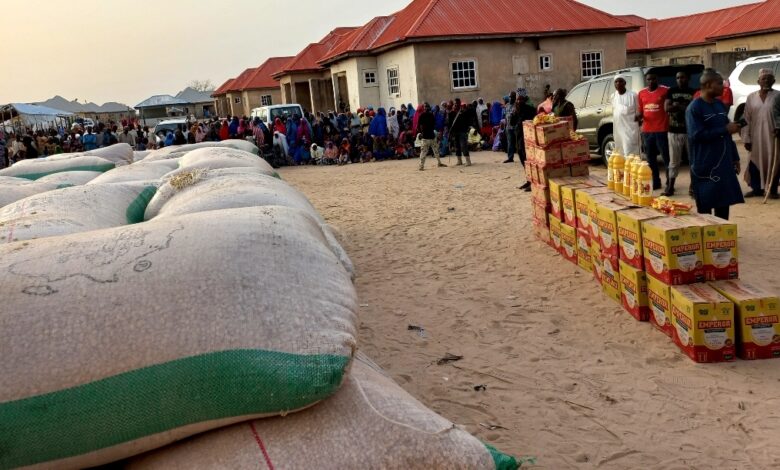Gubio IDP Camp In Northeast Nigeria Gets First Food Aid In 6 Months
Internally Displaced Persons in Gubio Camp in Nigeria's Borno State have suffered months of hunger and deprivation following government policy banning aid workers from taking relief support to camps within Maiduguri.

After months of hunger and starvation, Internally Displaced Persons (IDPs) in Gubio camp in Maiduguri, the capital of Borno State in Northeast Nigeria, got a degree of respite on Thursday, June 16, with the disbursement of food supplies by the state government.
To the IDPs, the food items and cooking ingredients brought to them on Thursday through the state emergency management agency (SEMA) were coming in that manner for the first time in nearly a year. But the officials say it’s been six months since humanitarian services like food distribution were provided.
HumAngle had previously reported the lack of food support in the Gubio camp, which caused the deaths of many of the displaced persons and exposed vulnerable women and girls to inhumane abuse, particularly sex for food.
In June last year, the state government issued a directive that banned humanitarian organisations from working in camps for displaced persons as authorities embarked on closing camps within Maiduguri.
The restrictions prevented International and local Nongovernmental Organisations from continuing with food, medical support as well as other services like hygiene services in the 16 camps that once existed in the state capital.
“But nothing happened since June last year; even the WFP (World Food Programme) had to stop working because the government said they would be sanctioned if they take palliative measures to any camp that have been profiled for closure,” said Musa Idris, an IDP in the camp.
The embargo placed by the government had compelled INGOs like World Food Programme (WFP) to stop its cash-for-food intervention at Gubio Camp. WFP is the official aid intervention agency assigned by the state humanitarian forum to work in the Gubio camp.
The government has closed down some of the camps while asking displaced persons to either choose to stay in a host community in Maiduguri or be relocated to their local government headquarters.
The last time officials took an inventory of the IDPs in Gubio camp was in June last year, which was an indication that they were due to depart the camp any time from that moment.
General Manager of the SEMA, Yabawa Kolo, says the agency added food grains to their normal distribution, even though giving it was not part of the agreement with other humanitarian agencies working in the camp.
“But for some reason, we observed that for some reasons that were beyond their control, the supply chain for food was cut off in this camp,” said Mrs Kolo.
According to her, in addition to providing cooking supplies to the IDPs, the agency provided 20,000kg of maize (400 bags) and 100 bags of beans.
However, local camp leaders who spoke to HumAngle on anonymity said the food was way too insufficient for the 4,419 households currently living in the camp.
On the insufficiency of the food supplied to the camp, Mrs Kolo explained that “usually when there are cases of high demand, they streamline the distribution pattern to target the most vulnerable groups.
“The vulnerability screening prioritises child-headed households with separated and unaccompanied children, female-headed households, the aged, the sick and persons with disabilities,” she said.
Support Our Journalism
There are millions of ordinary people affected by conflict in Africa whose stories are missing in the mainstream media. HumAngle is determined to tell those challenging and under-reported stories, hoping that the people impacted by these conflicts will find the safety and security they deserve.
To ensure that we continue to provide public service coverage, we have a small favour to ask you. We want you to be part of our journalistic endeavour by contributing a token to us.
Your donation will further promote a robust, free, and independent media.
Donate HereStay Closer To The Stories That Matter




